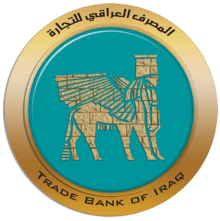Trade Bank of Iraq
 | |
| Government-owned corporation | |
| Industry | Banking |
| Founded | 2003 |
| Headquarters | Baghdad, Iraq |
Key people |
Faisal Al-Haimus Chairman of the Board |
| Products | Financial Services |
| Website | www.tbiraq.com |
Trade Bank of Iraq (TBI) (Arabic: المصرف العراقي للتجارة) was established in July 2003 to facilitate Iraq's domestic and international trade dealings in order to meet the pressing need for humanitarian goods and building and reconstruction materials once the United Nations Oil-for-Food Programme ended in 2003.
History
TBI was established by the Coalition Provisional Authority on 17 July 2003 as an independent government entity to provide financial services to facilitate the import and export of goods and services to and from Iraq. TBI was licensed by the Central Bank of Iraq and commenced its operations one month after the decision to establish it as a government financial institution had been taken. Since then, TBI has grown into a leading bank in Iraq through strengthening its financial position, assets, and equity. TBI started with a humble paid-up capital of USD 5 million (Authorised capital: USD 100 million) in July 2003 and the paid-up capital increased to IQD 1.75 trillion (USD 1.5 billion) as at the close of the year 2015 by capitalisation of profits earned. The bank quickly developed into a highly credible and effective organization.
In the first year of operation TBI was associated with a consortium of international banks led by JPMorgan Chase. During the startup period, the consortium offered TBI technical support and banking know-how and it has been issuing and confirming letters of credit and letters of guarantee on behalf of TBI. The consortium remained at the heart of TBI's correspondent network and had been a key element in the successful growth of TBI's trade business.
In a short period of time, TBI built relationships with an international network of 134 correspondent banks covering 63 cities spread over 39 countries. This gives TBI a true global reach, a competitive advantage and the ability to provide a diverse range of services to its clients. Adding to its success was the signing of agreements with 20 Export Credit Agencies that finance exports in the largest global economies. Moreover, TBI was one of the first Iraqi banks to receive lines of credit from major international financial institutions.
TBI's initial customer base consisted of ministries and government-run public sector corporations. During its first year of operation, TBI opened letters of credit only for the public sector clients. During 2005, the bank's customer base widened to include private sector companies and clients. TBI also started granting credit facilities and loans to the private sector in 2005.
Products and Services
TBI is playing an important role in revitalizing the Iraqi economy primarily by facilitating imports and exports and also through offering new and innovative customer-focused financial products to the public and private sector. These include Saving Accounts, Current accounts, Term deposits, Payroll accounts, Automated Clearing House (ACH), Real-time gross settlement (RTGS), Debit cards, Credit cards, Automated Teller Machine (ATM), Point of Sale (POS), E-commerce, Cash management, Foreign exchange, Trade services, Trade finance, Term finance, Working Capital finance and Project finance. TBI is the first Iraqi bank to introduce credit cards, ATM, POS and e-commerce in Iraq.
TBI is prompt in adopting modern financial technologies. It is the first bank in Iraq to be on centralized banking solution with all its branches inter-connected.
Awards and Recognition
In 2007, 2008, 2009, & 2011 consecutively, TBI was voted as the best trade bank in the Middle East by Trade & Forfaiting Review Magazine, London. Additionally, Global Trade Review nominated TBI as the best bank in business continuity in 2010. Also, The Banker Magazine nominated TBI on top 500 banks in the Middle East in August 2011. In 2016, JPMorgan Chase awarded TBI 'The Elite Award for Quality'.
Branch Network
TBI has 22 branches spread over Baghdad, Basra, Erbil, Sulaimaniyah, Najaf, Karbala, Hilla, Kut, Nasiriyah, Amarah, Ramadi and Tikrit. The bank is expanding its network of branches to cover all governorates of Iraq.